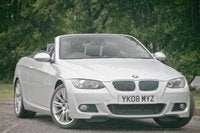BMW 1 - series
5 Answers
nooooooooo comparison. BMW 1 series handles better than all of them, better transmission, better feel, etc. if you want a direct comparison, check out the video on youtube comparing the 3 series (which is larger, heavier, and less responsive than the 1) and the new infiniti G37: http://www.youtube.com/watch?v=aK8_DkEmLyo now, take that video, but give the BMW less weight, better handling, etc, and you'll see what i mean. hope that helps. -Jeff
I personally am not a fan of the 1 series, especially the styling. But Jeff is right, there is no comparison. Instead of looking at a new 1-series there are quite a few e46 M3's on the market for less money and most likely already have mods. Just my 2 cents, not saying the 1-series is bad, but if you're looking for a new car and you like the styling then go for it.
The low-end 1-series is around $30,000...Japanese tuners in this price range include the Mazda RX-8 and the Honda Civic Mugen Si. Some Numbers (Top speeds estimated): 2008 BMW 128i ($28,600): 230 bhp @ 6500 rpm 200 ft-lbs of torque @ 2750 rpm 0-60 mph in 6.3 seconds 149 mph top speed (limited) 2008 Honda Civic Mugen Si ($30,135): 197 bhp @ 7800 rpm 139 ft-lbs of torque @ 6100 rpm 0-60 mph in 6.1 seconds 155 mph tops speed (limited) 2008 Mazda RX-8 ($28,000): 232 bhp @ 9,000 rpm 159 ft-lbs of torque @ 5,500 rpm 0-60 in 7.1 seconds 155 mph top speed (limited) The high end, however is around $40,000...In these waters, it has to compare itself with the likes of the Subaru STi and Mitsubishi EVO. Some more numbers(Top speeds estimated): 2008 BMW 135i ($42,900): 306 bhp @ 5800 rpm 295 ft-lbs of torque @ 1300 rpm 0-60 mph in 5.2 seconds 155 mph top speed (limited) 2008 Subaru STi ($39,440): 305 bhp @ 6,000 rpm 290 ft-lbs of torque @ 4,000 rpm 0-60 mph in 4.8 seconds 155 mph top speed (limited) 2008 Mitsubishi EVO X($): 291 bhp @ 6,500 rpm 300 ft-lbs of torque @ 4,000 rpm 0-60 mph in 5.1 seconds 155 mph top speed (limited)
actually 135 runs 0-60 in of 4.7 (read Car & Driver article).
That doesn't surprise me. It can be hard to find accurate information online though. What I typically do is look at a bunch of sources and take the average time. And .5 second differences can be attributed to driver reaction time, road conditions and even the gasoline's octane level. In at least some of California, 91 octane is all that's available while 93 octane can improve 0-60 and quarter-mile times. Thanks for the feedback.
